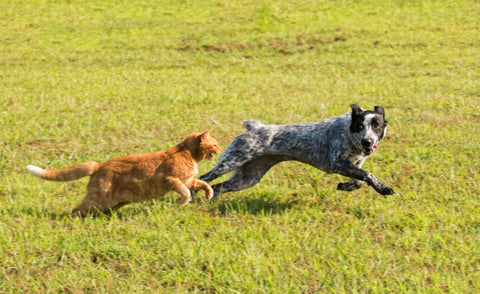

Key Nutrients for Healthy Joints & More
As pet owners, we want our furry friends to feel and look great. A shiny coat, healthy skin, and flexible joints show how well your pet is doing. These signs are not just about appearance; they show how your pet is thriving. Regular exercise and grooming are important, but the nutrients in your pet's food and supplements matter even more. Let's dive into the nutrients that help keep your pet's joints, skin, and coat healthy. We will also talk about why a good diet is important for their well-being.
Are there any supplements that can help improve joint health?
Yes, supplements like glucosamine, chondroitin, omega-3 fatty acids, and MSM are helpful for joint health in pets. These nutrients can support the health of cartilage. They can also reduce inflammation and improve overall joint function. This leads to several health benefits, giving your furry friend better mobility and comfort.
Nutrition for Healthy Joints, Skin, and Coat
1. Vitamin C: The Collagen Builder
Vitamin C is well-known for boosting the immune system, but it is also very important for the health of your pet's joints and skin. This vitamin dissolves in water and is found in citrus fruits and vegetables like broccoli, kale, spinach and cauliflower. It helps make collagen, which supports cartilage, skin, and connective tissues. Additionally, vitamin K-rich foods can contribute to healthier joints as well. Plus, it acts as a strong antioxidant. This means it helps reduce inflammation by fighting off free radicals that can harm cells.
Where to Find It:
- Fruits such as blueberries and cranberries are often found in high-quality pet foods.
- There are special joint supplements made for pets.
How It Helps:
- Joint Health: Vitamin C helps repair and maintain cartilage. This makes it very important for pets with arthritis or joint pain.
- Skin Elasticity: Vitamin C keeps the skin firm and hydrated. It helps reduce dryness and wrinkles.
- Inflammation Reduction: The antioxidant properties fight oxidative stress. This can help with joint pain and skin irritation.
2. Salmon Oil: Omega-3 Fatty Acids for Coat and Mobility
Salmon oil is full of nutrients that are great for pets. It has omega-3 fatty acids like EPA and DHA. These fatty acids help improve joint health, keep the skin hydrated, and make the coat shiny. It's especially good when taken from fatty fish.
Where to Find It:
- Special pet foods that list fish as the main ingredient.
- Top-notch fish oil supplements.
How It Helps:
- Joint Health: Omega-3s help lower inflammation in joints. This is especially helpful for older pets or those with arthritis.
- Skin and Coat: Omega-3s nourish the skin from the inside out. This helps reduce flakiness and itchiness, making the coat softer and shinier.
- Immune Support: Omega-3s strengthen the immune system. They assist pets in fighting skin problems caused by allergies or irritants.
articlebanners1
3. Hyaluronic Acid: Joint Lubrication
Hyaluronic acid is a natural substance that is present in the body's connective tissues. It helps keep joints moving smoothly and keeps the skin hydrated. For pets, especially senior dogs or cats, hyaluronic acid can greatly improve their mobility and skin condition.
Where to Find It:
- Joint supplements made for dogs and cats.
- Food special for older pets or pets with joint problems.
How It Helps:
- Joint Mobility: Hyaluronic acid helps hold water in connective tissues. This keeps joints well-lubricated and helps with stiffness and pain.
- Skin Hydration: It helps keep the skin hydrated, keeping it elastic and reducing dryness, especially in different seasons.
4. Vitamin E: Antioxidant for Radiant Skin
Vitamin E is a kind of vitamin that mixes well with fats. It is important for keeping skin cells healthy and for a shiny coat. This vitamin, along with vitamin D, is also a strong protector. It helps keep cells safe from damage that can come from free radicals.
Where to Find It:
- Good dry and wet pet foods that have important vitamins.
- Special supplements for skin and coat.
How It Helps:
- Skin Repair: Helps heal small cuts, scrapes, or skin problems more quickly.
- Coat Shine: Improves the feel and shine of fur, making it look and feel better.
- Protective Barrier: Boosts the skin's natural ability to fight dryness and irritants.
5. Zinc Picolinate: Mineral for Hair and Skin
Zinc is a trace mineral that is very important for your pet's skin, coat, and immune health. When zinc is combined with picolinic acid, it is easier for your pet to absorb. This helps ensure your pet gets the zinc it needs.
Where to Find It:
- Premium pet foods often include meats like chicken and beef.
- There are multivitamin supplements available for pets.
How It Helps:
- Wound Healing: Zinc is important for fixing damaged skin.
- Reduced Shedding: It strengthens hair roots to reduce fur loss.
- Anti-Inflammatory: Zinc helps calm skin issues like hot spots or eczema.
6. Biotin: B Vitamin
Biotin is also known as vitamin B7. It is very important for making keratin. Keratin is a protein that helps build skin, hair, and nails.
Where to Find It:
- Premium pet foods contain eggs, fish, and some grains that are safe for pets.
- There are also supplements for the skin and coat.
How It Helps:
- Thicker Fur: Helps grow a thick and healthy coat.
- Flake-Free Skin: Cuts down on dandruff and dryness in the skin.
- Strong Nails: Aids in stopping nails from being weak or breaking.
7. Turmeric
Turmeric is a powerful antioxidant that can help with joint swelling and reduce chronic inflammation in pets. It contains curcumin, which has anti-inflammatory properties that can benefit your pet's overall joint function and mobility.
Where to Find It:
- Supplements are available for pets in the form of powders, capsules, or treats.
- Can also be found in high-quality pet foods.
How It Helps:
- Joint Health: Turmeric can help alleviate symptoms of arthritis and improve joint flexibility.
- Anti-Inflammatory: Reduces inflammation in joints, easing discomfort and promoting better mobility.
- Immune Support: Boosts your pet's immune system to keep them healthy and active.
articlebanners2
Additional Nutrients for Healthy Joints
1. Protein
Protein is a key part of a healthy diet for dogs and cats. It helps keep their muscles strong, supports their joints, and improves their coat.
Found In:
- Whole meats like chicken, beef, turkey, or fish.
Benefits:
- It helps build and fix tissues, like skin and cartilage.
- It keeps muscle mass strong to help with joint health.
2. Omega-6 Fatty Acids
These fatty acids work well with omega-3s. They help keep your pet’s skin moist and reduce dandruff.
Found In:
- Chicken fat and olive oil, sunflower oil and other vegetable oils.
Benefits:
- Makes skin more moisturized.
- Stops dry and flaky spots.
3. Glucosamine and Chondroitin
These natural compounds help keep cartilage healthy. They also make it easier for older pets to move around.
Found In:
- Senior pet foods or joint supplements.
Benefits:
- Lessens joint stiffness.
- Shields cartilage from damage and wear.
articlebanners3
4. Calcium: Yogurt & Other Dairy Options
The appropriate amount of calcium is essential for strong bones and teeth in pets. It also plays a crucial role in muscle function and nerve transmission. Yogurt and other dairy products are excellent sources of calcium.
Found In:
- Yogurt, cheese, and milk.
Benefits:
- Strengthens bones and teeth.
- Supports muscle function and nerve transmission.
Incorporating these nutrients into your pet's diet can significantly contribute to their overall joint health and mobility. From zinc to biotin, protein to omega-6 fatty acids, each nutrient plays a vital role in ensuring your pet's well-being. Remember, a balanced diet is key to keeping your pet happy and healthy for years to come.
Why a High-Quality Diet Matters
Choosing the right food helps your pet get the nutrients they need each day. Here’s what to consider:
- Whole Ingredients: The top ingredient must be a specific protein, not a by-product or filler.
- Balanced Fat Content: Omega fatty acids should come from good sources like fish oil or chicken fat.
- No Artificial Additives: Stay away from extra chemicals or fillers.
Impact of Specific Diets on Joint Health
Incorporating coat supplements that are rich in important nutrients, like amino acids, can really help your pet feel good. Also, high-quality pet foods that include things like protein, omega-6 fatty acids, glucosamine, chondroitin, and bone broth can support your pet’s joints and bone health in a natural way. When you choose the right food for your pet, make sure to look for whole ingredients. A proper balance of fat is key too. It's best to avoid fake additives so your pet gets the nutrients they need every day.
These supplements help keep your pet's joints healthy and can make their fur thicker and nails stronger. Proteins help repair tissue and keep muscles strong. Omega-6 fatty acids and healthy fats also keep the skin moist, which helps stop dryness and flaking. A balanced diet with omega-6 fatty acids is good for your pet's joint health. These key nutrients from chicken fat and sunflower oil work well with omega-3s. Together, they help maintain skin hydration and prevent dry patches.
Diet in Managing Inflammation and Arthritis
A good diet is possibly the most important building block for managing joint inflammation and keeping your pet's joints healthy, especially for pets with rheumatoid arthritis. This helps to improve their quality of life. You can add anti-inflammatory foods to their meals. Some good options are chia seeds, brussels sprouts, and omega-3 fatty acids, which are beneficial for heart health, turmeric, and antioxidants. These can help reduce swelling and support joint function. It is also better to choose whole foods instead of processed ones. This can help with inflammation and overall joint health, contributing to your pet's overall health. Remember, providing the right nutrients in their diet is key to making your pet happy and active.
Weight Management for Osteoarthritis
Maintaining a healthy weight is very important for your pet's joint health and preventing weight gain. A good diet plays a big role in this. When pets gain extra weight, it can put too much pressure on their joints. This pressure can lead to problems like arthritis and less ability to move. You can help your pet manage their weight by controlling their food portions and getting them to exercise regularly. A healthy weight, backed by a nutritious diet, not only helps your pet feel better overall but also keeps their joints strong and working well for many years.
Foods to Avoid for Optimal Joint Health
It is important to pay attention to some foods that can harm your pet's joint health. Foods that are high in sugar and refined carbs can cause inflammation. This can make joint pain and stiffness worse. Also, too much salt can make your pet hold onto extra water, which can hurt their joints. By staying away from processed and fatty foods, you can help keep your pet’s joints healthy. A balanced diet that meets your pet's needs is the best way to keep their joints strong and healthy.
articlebanners4




